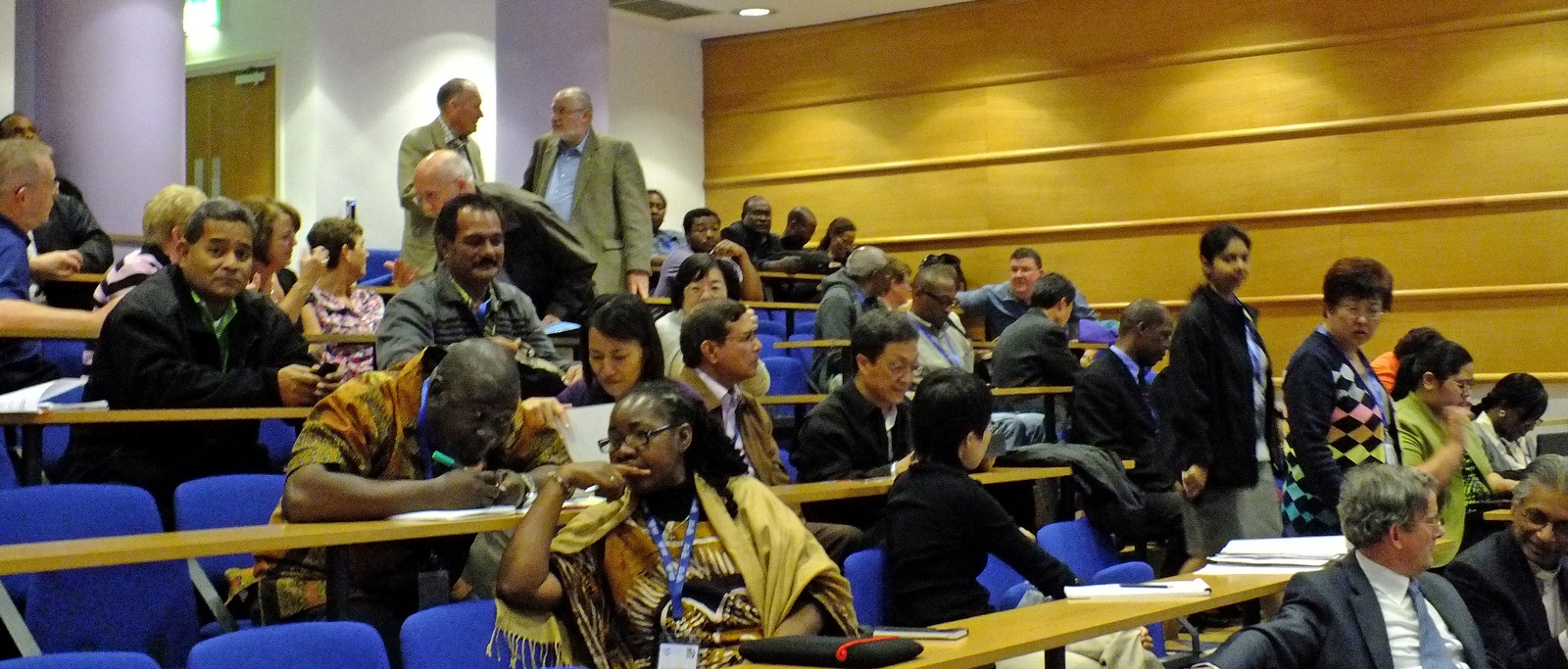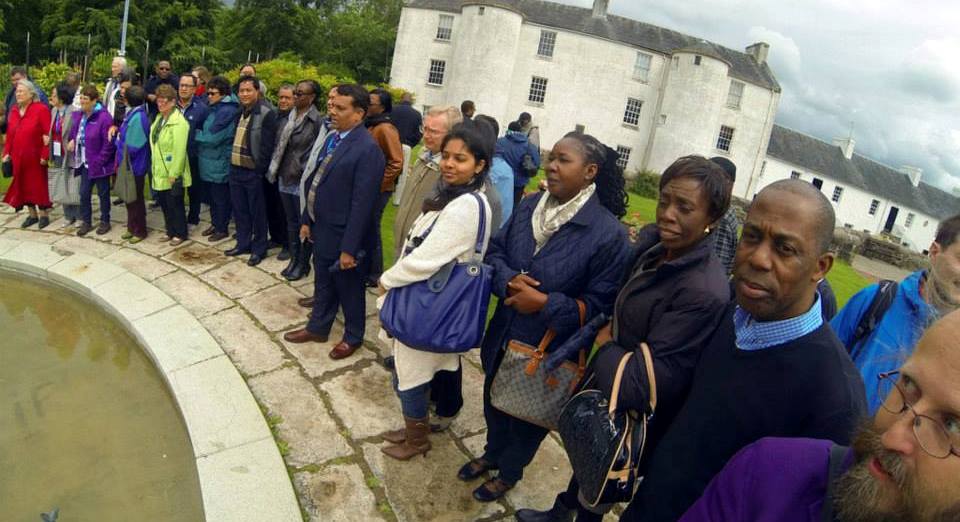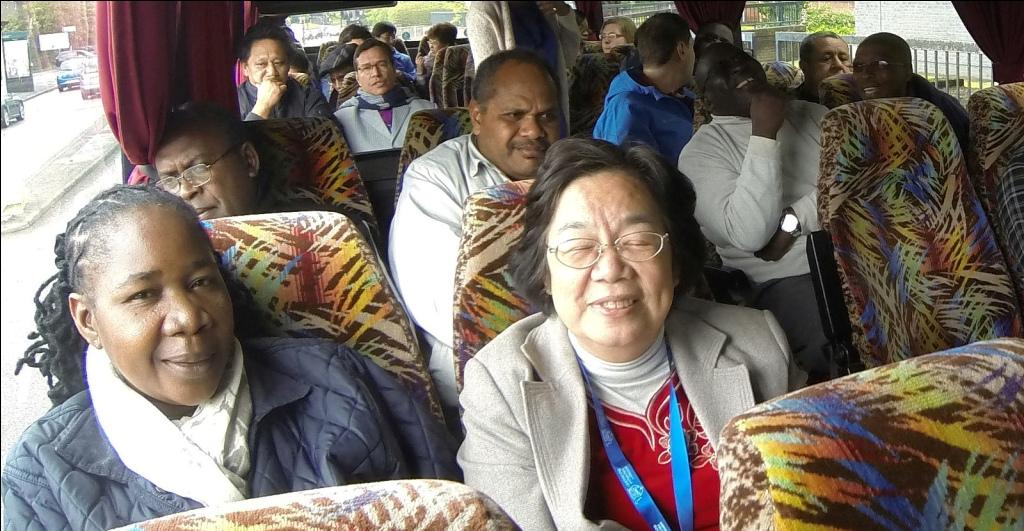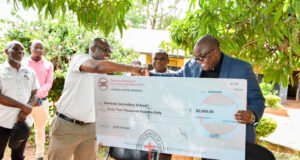 The Council for World Mission (CWM) and its executive committee conducted their Executive and Council meetings from 13th to 19th June 2013 in Scotland to give recognition to the Bi-centenary of the birth of Dr David Livingstone.
The Council for World Mission (CWM) and its executive committee conducted their Executive and Council meetings from 13th to 19th June 2013 in Scotland to give recognition to the Bi-centenary of the birth of Dr David Livingstone.
The General Secretary of the United Church of Zambia (UCZ), Reverend Peggy Mulambya Kabonde, represented the UCZ in Glasgow, Scotland, at the invitation of Council for World Mission (CWM).
Reverend Kabonde joined other Church leaders from different parts of world in the Scottish capital.
 The keynote speech for the 2013 CWM Council was delivered by the Rev. Dr Michael Jagessar. Dr Jagessar hoped to convey a message of hope that comes from an understanding of the lessons that can be received of the life and work of David Livingstone.
The keynote speech for the 2013 CWM Council was delivered by the Rev. Dr Michael Jagessar. Dr Jagessar hoped to convey a message of hope that comes from an understanding of the lessons that can be received of the life and work of David Livingstone.
The main question of the lecture was rooted in the accusation levelled at Livingstone, that he was a harbinger of colonialism and imperial oppression. Jagessar asks the question: ‘to what extent have we adequately assessed and responded to the tragic collusion of Christian mission and empire as we experience and practice mission today?’ This question is reflected in the CWM theology statement ‘Mission in the Context of Empire’.
For Jagessar, the use of the word Beyond ‘is ripe with possibilities, especially when in the context of post-colonialism’. The potential of this word in this context is one of progress; it looks to the future and empowers the witness with possibilities.
Jagessar reminds us that ‘none of us are disembodied spirits’. We do not exist in isolation, in terms of the individual in society, or, indeed in terms of flesh and blood. Human weakness and failings are part of our existence. David Livingstone was a product of his generation, albeit a forward thinking one. As such it is fair to level criticism at his working methods; however, the criticisms such as they are should not diminish the importance of that work. The significance of his legacy is still felt in the parts of the African sub-continent that he visited, and in the very existence of this organisation, CWM.
Jagessar approaches an understanding of Livingstone’s legacy through three ‘Cs’:
Commitment: ‘Livingstone was touched by the power of God’s love in Christ and a deep desire to share it to the ends of the earth’. Specifically referring to the churches in the UK, Jagessar argues that ‘there is much to learn from both the fervour and shortcomings of Livingstone in our calling to live out God’s mission in Christ’.
Crossing frontiers: ‘In obedience to God, this man moved out beyond his own fears and cultural comfort zones into an adventure of the unknown’. This crossing of frontiers does not necessarily have to be international. Churches should have their mission rooted in their community, not simply looking after their own but working for the good of all humanity that shares that space. Immigration poses a challenge to the mission statements of churches that cannot be avoided. There are strangers in our communities that the church should reach out to. Jagessar offers these words of advice: ‘Learning how to generously do our God-talk together, without reducing the practices of the “newcomer” as underdeveloped or conservative, or those of the “host” churches as impoverished spiritually, is an urgent task. We are all in need here’.
Conscience: Livingstone’s efforts to open up the sub-continent to legitimate commerce as an alternative to slavery is often criticised for being the main method through which foreign exploiters were able to take advantage of a vulnerable people. Whilst Jagessar accepts this accusation as valid, his response is to frame Livingstone’s legacy through the eyes of his contemporaries, rather than retrospect. ‘This [conscience] is evident from his strategy to work against the curse of slavery. He saw the introduction of legitimate commerce as a way to counter the dehumanising Slave trade. Christian faith must offer the good news of liberation and salvation to the peoples of Africa as well as the slavers’.
 The challenge of Livingstone’s legacy of conscience resonates with the Council that is meeting at the same time as the G8 world leaders’ summit, meeting in Northern Ireland. Livingstone campaigned for justice, for liberation and for hope. CWM should reflect these values in its advocacy work alongside and with the member churches. Jagessar, drawing on a recent essay by Monbiot offers a warning to the future well-being of the African continent: ‘An alliance for ’food security and nutrition’, intended to lift the millions of poor people out of Africa brings together corporate partners such as Monsanto, Cargill, Dupont, Syngenta, Nestlé, Unilever, Itochu, among others. Africa’s lands and seeds are once again being taken over in the name of the well-being of Africans. And, there are no shortage of African leaders and elite who have more in common with the global elite than with their own people, making the alliance of vampires powerfully trans-national’.
The challenge of Livingstone’s legacy of conscience resonates with the Council that is meeting at the same time as the G8 world leaders’ summit, meeting in Northern Ireland. Livingstone campaigned for justice, for liberation and for hope. CWM should reflect these values in its advocacy work alongside and with the member churches. Jagessar, drawing on a recent essay by Monbiot offers a warning to the future well-being of the African continent: ‘An alliance for ’food security and nutrition’, intended to lift the millions of poor people out of Africa brings together corporate partners such as Monsanto, Cargill, Dupont, Syngenta, Nestlé, Unilever, Itochu, among others. Africa’s lands and seeds are once again being taken over in the name of the well-being of Africans. And, there are no shortage of African leaders and elite who have more in common with the global elite than with their own people, making the alliance of vampires powerfully trans-national’.
Jagessar set out two challenges to CWM and its member churches worldwide, in regards to the global programme of developing Missional congregations.
Mission as missio dei: what is God’s mission? What is the nature of this God that CWM and its member churches seek to serve? Does the faith that is held restrict the understanding of the scope of mission in our contexts?
Mission as hospitality: ‘Much is being written on mission as hospitality to the extent that what we now need is to live it out fully’.
To conclude, Jagessar offers these words which resonate with the theme for the 2013 Council and the overall theme of the CWM Global Assembly ‘Hope: The Language of Life’:
‘Our hope is a faith and theological conviction that affirms the generosity of God in Christ – God who loves us extravagantly. In small ways we strive to live by the conviction that the currency of the kingdom is grace which we have been gifted with in abundance. Through this grace and with the help of the Holy Spirit, we strive to believe in more than what is believable in order to work with others to participate in God’s offer of ‘fullness of life’ in Christ for all’.
Download Rev. Jagessar’s Keynote Address UCZ Synod United Church of Zambia
UCZ Synod United Church of Zambia




